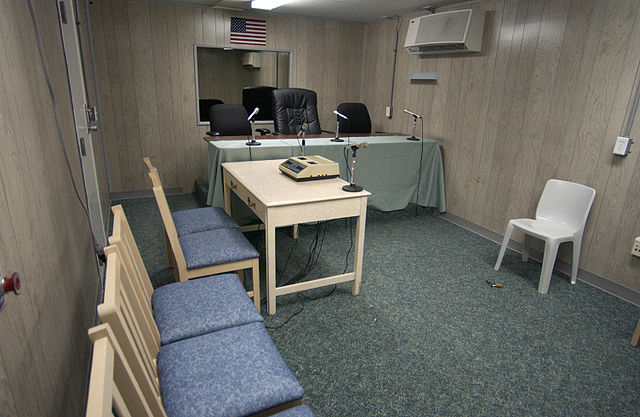Loading AI tools
Yemeni former Guantanamo Bay detainee (born 1980) From Wikipedia, the free encyclopedia
Muhammad Ali Abdallah Muhammad Bwazir is a citizen of Yemen, once held in extrajudicial detention in the United States Guantanamo Bay detainment camps, in Cuba.[2] Bwazir's Guantanamo Internment Serial Number was 440. American intelligence analysts estimate he was born in 1980, in Hawra', Yemen.
| Muhammad Ali Abdallah Muhammad Bwazir | |
|---|---|
 | |
| Born | c. 1980 (age 43–44)[1] Hawra', Yemen |
| Citizenship | Yemen |
| ISN | 440 |
| Charge(s) | extrajudicial detention |
| Status | released |
Bwazir arrived in Guantanamo on May 1, 2002.[3][4]
In December 2015, unnamed officials leaked that Congress had been given notice that 17 individuals would be transferred from Guantanamo starting in thirty days.[5] The US military planned to transfer the last three of those seventeen on January 21, 2016. Both his lawyers and military officials were surprised when Bwazir balked at the last moment, and declined repatriation.
On January 5, 2017, Bwazir and three other Yemeni men were transferred to Saudi Arabia.[6][7]
The Washington Post reports that Bwazir's lawyers assert that Bawazir was one of those participating in the 2006 Guantanamo hunger strike, and that the new harsher procedures camp authorities instituted to break the hunger strike violated last fall's proscription on torture.[8]
Camp authorities have been force-feeding hunger strikers. In January 2006, camp authorities started using "restraint chairs" to feed detainees.[9]
The Center for Constitutional Rights quoted from the emergency injunction Bwazir's lawyers filed on his behalf, in reaction to what they described as the unnecessary violence of his force-feeding in the restraint chair:[10]
Medical records show Bwazir's weight had dropped to 97 pounds, during the 140 days of his hunger strike.[11] Medical records show Bawazir was restrained in the chair longer than the manufacturer's directions.
Lieutenant Colonel Jeremy Martin asserted that the force-feedings were conducted humanely. He explained the extraordinary duration of the detainee's confinement to the restraint chair was due to the length of time the force-feeding took.
U.S. government lawyers argued that the bans on torture and cruel and unusual treatment didn't apply to captives in Guantánamo Bay.[12] Justice Gladys Kessler called the allegations "extremely disturbing".
On February 11, 2009, US District Court judge Gladys Kessler declined to bar the use of restraint chairs for force-feeding Mohammed Ali Abdullah Bwazir and Omar Khamis Bin Hamdoon.[13] Kessler has noted that Bwazir and Hamdoon's petition stated that the use of the restraint chair was "tantamount to torture". However, she stated the opinion that because she lacked the medical expertise to evaluate the position of the camp's medical authorities she lacked jurisdiction to rule on the petition.
According to the Agence France Presse, Bwazir and Hamdoon were not opposed to being force fed, and so claimed in their petition that the use of restraints was unnecessary. According to the Agence France Presse, camp authorities are withholding medical treatment for their other ailments from the hunger strikers, in an attempt to pressure them to quit their strike.[13]
Originally, the Bush Presidency asserted that captives apprehended in the "war on terror" were not covered by the Geneva Conventions, and could be held indefinitely, without charge, and without an open and transparent review of the justifications for their detention.[14] In 2004, the United States Supreme Court ruled, in Rasul v. Bush, that Guantanamo captives were entitled to being informed of the allegations justifying their detention, and were entitled to try to refute them.

Following the Supreme Court's ruling, the Department of Defense set up the Office for the Administrative Review of Detained Enemy Combatants.[14][17]
Scholars at the Brookings Institution, led by Benjamin Wittes, listed the captives still held in Guantanamo in December 2008, according to whether their detention was justified by certain common allegations:[18]
A habeas corpus petition was filed on Bwazir's behalf in 2005.[19]
On April 25, 2011, whistleblower organization WikiLeaks published formerly secret assessments drafted by Joint Task Force Guantanamo analysts.[20][21] His 9-page Joint Task Force Guantanamo assessment was drafted on October 27, 2008.[22] It was signed by camp commandant Rear Admiral David M. Thomas Jr. He recommended continued detention.
Seamless Wikipedia browsing. On steroids.
Every time you click a link to Wikipedia, Wiktionary or Wikiquote in your browser's search results, it will show the modern Wikiwand interface.
Wikiwand extension is a five stars, simple, with minimum permission required to keep your browsing private, safe and transparent.